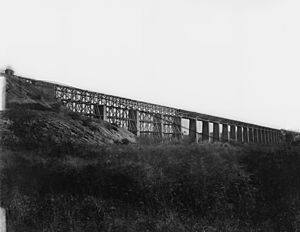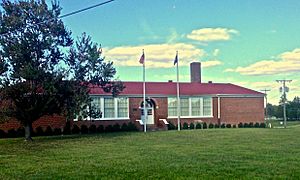Farmville, Virginia facts for kids
Quick facts for kids
Farmville, Virginia
|
|||
|---|---|---|---|
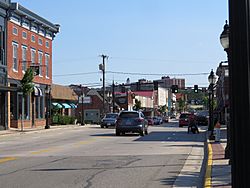
Downtown Farmville in June 2017.
|
|||
|
|||
| Nickname(s):
The Heart of Virginia
|
|||
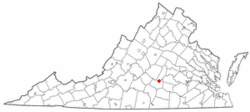
Location of Farmville, Virginia
|
|||
| Country | United States | ||
| State | Virginia | ||
| Counties | Prince Edward, Cumberland | ||
| Government | |||
| • Type | Local | ||
| Area | |||
| • Total | 7.82 sq mi (20.25 km2) | ||
| • Land | 7.68 sq mi (19.89 km2) | ||
| • Water | 0.14 sq mi (0.37 km2) | ||
| Elevation | 351 ft (107 m) | ||
| Population
(2020)
|
|||
| • Total | 7,473 | ||
| • Estimate
(2021)
|
7,202 | ||
| • Density | 973.7/sq mi (355.64/km2) | ||
| Time zone | UTC-5 (Eastern (EST)) | ||
| • Summer (DST) | UTC-4 (EDT) | ||
| ZIP codes |
23901, 23909, 23943
|
||
| Area code(s) | 434 | ||
| FIPS code | 51-27420 | ||
| GNIS feature ID | 1498477 | ||
Farmville is a town in Virginia, a state in the United States. It is located in both Prince Edward and Cumberland counties. In 2020, about 7,473 people lived here. Farmville is also the main town, or county seat, of Prince Edward County.
This town grew up near the start of the Appomattox River in central Virginia. The river was once the main way to transport goods. Later, a railroad was built, and today, that old railway is part of the High Bridge Trail State Park. This park is over 30-mile-long (48 km) and is great for walking or biking. Major roads like US 15, VA 45, and US 460 meet in Farmville. The town is also home to Longwood University and is close to Hampden–Sydney College.
Contents
- Farmville's Past: A Look at History
- River Travel and Canals
- Local Coal Mining History
- Railroads Connect Farmville
- Civil War Events in Farmville
- Independent Order of Odd Fellows Cemetery
- Making Bricks in Farmville
- Farmville Lithia Springs Water
- Economic Differences in the Past
- Davis v. County School Board of Prince Edward County
- Historic Places in Farmville
- Recent Events in Farmville
- Farmville's Location and Climate
- People of Farmville: Demographics
- Fun in Farmville: Arts and Culture
- Learning in Farmville: Education
- Town Services: Infrastructure
- Famous People from Farmville
- See also
Farmville's Past: A Look at History
Farmville was officially formed in 1798 and became an incorporated town in 1912. It is located near the start of the Appomattox River.
River Travel and Canals
From 1795 to 1890, Farmville was the end point for the Upper Appomattox Canal Navigation System. This system of canals was built to make the river easier to travel on. It allowed crops like tobacco and other farm goods to be loaded onto boats called James River bateaus in Farmville. These goods were then shipped to Petersburg, Virginia. The canals were used until railroads were built in the area.
Many of the boatmen who worked near Farmville were free people of color. They lived in a community called Israel Hill. This community was special because both white people and free African-American workers lived there. These African Americans had gained their freedom around the time of the Revolutionary War. People of different backgrounds worked for the same pay, built a church together, and could use the law courts in this 350-acre town.
Local Coal Mining History
People started mining coal near Farmville in 1833. In 1837, a company called The Prince Edward Coal Mining Company was given permission to mine and sell coal. This company operated until the 1880s.
The coal found here is part of the Farmville Basin. This area is west of today's Virginia State Route 45.
| Private | |
| Industry | Coal |
| Founded | (March 24, 1837) |
| Defunct | 1880s |
| Headquarters | Farmville, Virginia |
|
Area served
|
Farmville |
Railroads Connect Farmville
In the 1850s, the Southside Railroad was built through Farmville. This connected Petersburg to Lynchburg. Building this railroad required an expensive bridge over the Appomattox River, which became known as the High Bridge. This rail line later became part of the Norfolk Southern Railway.
Today, the old rail line from Burkville to Pamplin City, including the High Bridge, has been turned into the High Bridge Trail State Park. It's a popular place for outdoor activities.
| Industry | Coal |
|---|---|
| Founded | 1860 in Raines Tavern, Virginia, Virginia, United States |
| Founder | John Dalby |
From 1884 to 1917, the Farmville and Powhatan Railroad (later called the Tidewater and Western Railroad) helped farmers in Cumberland County sell their fruits, vegetables, and timber in Farmville. This railroad also provided transportation and telegraph services.
| Private | |
| Industry | Coal |
| Founded | (1881) |
| Headquarters | Farmville, Virginia |
|
Area served
|
Farmville |
The Farmville Coal and Iron Company started in 1881. They built a short rail line to connect a coal mine to the Farmville and Powhatan Railroad. This allowed coal to be shipped to docks far away. However, this company struggled because coal from other areas could be mined and shipped more cheaply. The company went out of business a few years later.
Even though the coal company didn't last, it brought positive changes. They asked the town to build an electric power plant and a waterworks. The power plant was set up in 1890, and the waterworks in 1893.
Civil War Events in Farmville
Near the end of the American Civil War, Confederate General Robert E. Lee and his army retreated through Farmville. They were trying to get food supplies that had been sent to the town. However, Union cavalry, led by General Philip Sheridan, arrived and surrounded Lee's army. General Lee surrendered at Appomattox Court House on April 9, 1865.
In 1871, Farmville became the official county seat for Prince Edward County.
Independent Order of Odd Fellows Cemetery
The Independent Order of Odd Fellows Cemetery is a historic burial ground in Farmville. Many important African American leaders and civil rights supporters are buried here. The cemetery also has about 31 headstones from World War I.
Notable Burials
- James W. D. Bland, a state senator
- Tazewell Branch (1828–1925), a member of the House of Delegates
- Nathaniel M. Griggs, who served in both the Virginia House of Delegates and Virginia Senate
- L. Francis Griffin, a civil rights activist who worked to end segregation in Prince Edward County's public schools
Making Bricks in Farmville
Farmville also had a brick-making industry because of the clay found in the Farmville Basin. In 1874, M.R. Murkland built a kiln to make bricks by hand. He produced about 600,000 bricks each year. The clay in the area was perfect for making bricks because it was easy to mix and didn't shrink too much.
Farmville Lithia Springs Water
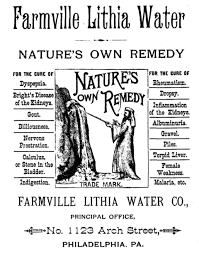
Farmville Lithia Springs Water Advertisement from Philadelphia
|
|
| Private | |
| Industry | Beverage |
| Fate | Bottling House burned down. |
| Founded | (1884-08-24) |
| Defunct | 1901-07-07 (dissolved) |
| Headquarters | Farmville, Virginia |
|
Area served
|
International |
From 1884 to 1901, a company called Farmville Lithia Springs bottled and sold mineral water from Farmville. The water was thought to be very healthy and was even shipped to other countries for "water cure" therapies. The springs were just north of the Appomattox River.
The water from Lithia Springs naturally contained minerals like:
- Lithia water
- Magnesium
- Chalybeate
- Iodine
- Alum
Economic Differences in the Past
In 1897, there were big differences in how well African Americans and white people lived in Farmville. Even though there were twice as many black people as white people, white people owned much more land and property. This made it hard for black people to get ahead financially. Many black men went north to find work, leaving women behind. However, the Israel Hill community was more stable because its residents owned their own land.
Davis v. County School Board of Prince Edward County
Farmville and Prince Edward County Public Schools were central to a very important court case called Davis v. County School Board of Prince Edward County (1952–54). This case became part of Brown v. Board of Education (1954), which was the landmark decision that ended school segregation (keeping students of different races separate) in the United States. The Davis case was unique because it involved student protests.
R.R. Moton High School, a school for black students in Farmville, suffered from terrible conditions. It didn't have a gym, a cafeteria, or even proper restrooms for teachers. Students often lacked desks or blackboards, and some classes were held in a school bus because of overcrowding. The all-white school board refused to give the school more money. Students protested these unfair conditions.
After the Brown decision, in 1959, Prince Edward County leaders refused to fund public schools. They closed all public schools for ten years rather than integrate them. Wealthy white students often went to private schools that were created just for white students. Black students and poorer white students had to find schools elsewhere or miss out on their education entirely. When the public schools finally reopened, they were fully integrated.
The former R.R. Moton High School building was recognized as a National Historic Landmark in 1998. It now houses the Robert Russa Moton Museum, which is a center for studying civil rights in education.
Historic Places in Farmville
Several important places in Farmville are listed on the National Register of Historic Places. These include the First Baptist Church, the Farmville Historic District, Longwood House, Robert Russa Moton High School, Sayler's Creek Battlefield, and Worsham High School.
Recent Events in Farmville
In September 2015, Farmville was chosen to host the 2016 vice-presidential debate. This important event took place at Longwood University on October 4, 2016.
The town is also crossed by the High Bridge Trail State Park. This trail extends 4 miles (6 km) east to the historic High Bridge.
Farmville's Location and Climate
Farmville is located in the northern part of Prince Edward County. The town center is south of the Appomattox River, but a part of the town stretches north across the river into Cumberland County.
The town covers about 7.3 square miles (19.0 km2) in total. Most of this area, about 7.2 square miles (18.7 km2), is land, and a small part, about 0.12 square miles (0.3 km2), is water.
Farmville is situated between Petersburg and Lynchburg on U.S. Route 460. Petersburg is about 67 miles (108 km) to the east, and Lynchburg is about 48 miles (77 km) to the west.
Farmville's Weather
Farmville has a humid subtropical climate. This means it has hot, humid summers and generally mild to cool winters.
| Climate data for Farmville, Virginia (1991–2020 normals, extremes 1897–present) | |||||||||||||
|---|---|---|---|---|---|---|---|---|---|---|---|---|---|
| Month | Jan | Feb | Mar | Apr | May | Jun | Jul | Aug | Sep | Oct | Nov | Dec | Year |
| Record high °F (°C) | 81 (27) |
85 (29) |
90 (32) |
96 (36) |
98 (37) |
106 (41) |
106 (41) |
106 (41) |
106 (41) |
100 (38) |
88 (31) |
82 (28) |
106 (41) |
| Mean daily maximum °F (°C) | 47.6 (8.7) |
51.1 (10.6) |
58.9 (14.9) |
69.3 (20.7) |
76.4 (24.7) |
84.1 (28.9) |
88.5 (31.4) |
86.6 (30.3) |
80.4 (26.9) |
70.7 (21.5) |
60.4 (15.8) |
51.0 (10.6) |
68.8 (20.4) |
| Daily mean °F (°C) | 36.7 (2.6) |
39.1 (3.9) |
46.2 (7.9) |
56.1 (13.4) |
65.0 (18.3) |
73.4 (23.0) |
77.9 (25.5) |
76.2 (24.6) |
69.5 (20.8) |
58.2 (14.6) |
47.5 (8.6) |
40.1 (4.5) |
57.2 (14.0) |
| Mean daily minimum °F (°C) | 25.7 (−3.5) |
27.1 (−2.7) |
33.6 (0.9) |
42.9 (6.1) |
53.7 (12.1) |
62.7 (17.1) |
67.3 (19.6) |
65.8 (18.8) |
58.7 (14.8) |
45.8 (7.7) |
34.7 (1.5) |
29.3 (−1.5) |
45.6 (7.6) |
| Record low °F (°C) | −16 (−27) |
−9 (−23) |
0 (−18) |
16 (−9) |
25 (−4) |
35 (2) |
45 (7) |
41 (5) |
30 (−1) |
12 (−11) |
9 (−13) |
−6 (−21) |
−16 (−27) |
| Average precipitation inches (mm) | 3.49 (89) |
3.00 (76) |
4.09 (104) |
3.42 (87) |
4.21 (107) |
3.31 (84) |
4.02 (102) |
3.60 (91) |
4.58 (116) |
3.62 (92) |
3.41 (87) |
3.72 (94) |
44.47 (1,130) |
| Average snowfall inches (cm) | 0.6 (1.5) |
3.1 (7.9) |
1.0 (2.5) |
0.0 (0.0) |
0.0 (0.0) |
0.0 (0.0) |
0.0 (0.0) |
0.0 (0.0) |
0.0 (0.0) |
0.0 (0.0) |
0.0 (0.0) |
1.4 (3.6) |
6.1 (15) |
| Average precipitation days (≥ 0.01 in) | 8.5 | 6.9 | 9.0 | 8.8 | 10.7 | 8.9 | 9.5 | 8.8 | 8.3 | 7.1 | 7.7 | 8.0 | 102.2 |
| Average snowy days (≥ 0.1 in) | 1.2 | 1.3 | 0.5 | 0.0 | 0.0 | 0.0 | 0.0 | 0.0 | 0.0 | 0.0 | 0.0 | 0.5 | 3.5 |
| Source: NOAA | |||||||||||||
People of Farmville: Demographics
| Historical population | |||
|---|---|---|---|
| Census | Pop. | %± | |
| 1860 | 1,536 | — | |
| 1870 | 1,543 | 0.5% | |
| 1880 | 2,058 | 33.4% | |
| 1890 | 2,404 | 16.8% | |
| 1900 | 2,471 | 2.8% | |
| 1910 | 2,971 | 20.2% | |
| 1920 | 2,586 | −13.0% | |
| 1930 | 3,133 | 21.2% | |
| 1940 | 3,475 | 10.9% | |
| 1950 | 4,375 | 25.9% | |
| 1960 | 4,293 | −1.9% | |
| 1970 | 4,331 | 0.9% | |
| 1980 | 6,067 | 40.1% | |
| 1990 | 6,046 | −0.3% | |
| 2000 | 6,845 | 13.2% | |
| 2010 | 8,216 | 20.0% | |
| 2020 | 7,473 | −9.0% | |
| 2021 (est.) | 7,202 | −12.3% | |
| U.S. Decennial Census | |||
In 2010, Farmville had 8,216 people living in 2,634 households. The town's population density was about 1,140 people per square mile. Most residents were white (72.3%), followed by African American (23.8%). There were also smaller groups of Native American, Asian, and other races. About 2.3% of the population was Hispanic or Latino.
The age of people in Farmville is greatly affected by Longwood University. Many residents are young adults between 18 and 24 years old (46.1%). The average age in Farmville was 22 years.
Since 2016, an Amish community has been living in the Farmville area. By 2020, there were 195 Amish people living there.
Fun in Farmville: Arts and Culture
Heart of Virginia Festival
The Heart of Virginia Festival started in 1978 and happens every year in Farmville. Before 2020, it was held on the first weekend in May. It featured traditional fun and ended with a fireworks show. The name "Heart of Virginia" comes from Farmville's central location in the state. After some cancellations due to the COVID-19 Pandemic, the festival moved to September in 2022. It now takes place during Longwood University's Family Weekend.
First Fridays Events
"First Fridays" are special events held on the first Friday of each month from May to September. These events feature live bands and family activities at Riverside Park.
Learning in Farmville: Education
Colleges and Universities
- Longwood University is a public school right in the middle of town, with about 5,000 students. It was founded in 1839 as a school for women and is one of the oldest public schools in the country. Longwood is well-known for training teachers. It became a co-ed school in 1976 and a university in 2002. Many national sororities were founded here, including Sigma Sigma Sigma, Alpha Sigma Alpha, Zeta Tau Alpha, and Kappa Delta.
- Hampden–Sydney College is one of America's oldest colleges, founded in 1775. It is an all-male private school located about 6 miles (10 km) southwest of Farmville. It has about 1,200 students.
Schools for Kids (K-12)
Students in the Prince Edward County part of Farmville attend schools in the Prince Edward County Public Schools district. All of these schools are located within Farmville.
Students in the Cumberland County part of Farmville attend schools in the Cumberland County Public Schools district.
There is also a private school in Farmville called Fuqua School. It is named after a prominent local businessman, J.B. Fuqua.
Town Services: Infrastructure
Volunteer Fire Department
The Farmville Volunteer Fire Department is the first fire department established in Prince Edward County, founded in 1870. They help nearly 10,000 people in Farmville and the surrounding areas of Prince Edward, Buckingham, and Cumberland counties.
The department has different types of fire trucks, including an engine, a ladder truck, and a rescue-squad. They also have vehicles for EMS and a trailer for handling dangerous materials.
Water and Sewer Services
Farmville's water and sewer services are managed by the town. The water treatment plant gets its water from the Appomattox River. The water is cleaned to remove any harmful germs and dirt before it's sent to homes and schools. The plant can store 200,000 gallons of clean water and can produce up to 3 million gallons per day. Farmville uses about 1 million gallons of water daily.
The wastewater plant treats about 1.7 million gallons of water each day from Farmville, Prince Edward schools, and nearby areas. This water goes through a thorough cleaning process before being released back into the Appomattox River. All residents in Farmville are required to use the public sewer system. The town regularly checks the water quality in its creeks and streams to make sure they are clean.
Famous People from Farmville
- Oliver Anthony, a singer-songwriter
- Chris Ashworth, an actor
- Blanche K. Bruce, a Senator
- Lieutenant General William G. Boykin, a former United States Deputy Undersecretary of Defense
- J. B. Fuqua, a successful businessman and giver, born near Farmville
- Vince Gilligan, a writer for The X-Files and the creator of Breaking Bad
- James B. Hughes, a publisher and politician
- Joseph E. Johnston, a Confederate general
- The Lady of Rage, an American rapper and actress
- James West, who helped invent the electret microphone
- Lieutenant General Samuel V. Wilson, a former Director of the Defense Intelligence Agency
Longwood University Students Who Became Famous
- Jerome Kersey (Class of 2006), a basketball player
- Pat McGee, the lead singer of the Pat McGee Band
- Jason Mraz, a singer-songwriter
- Michael Tucker (Class of 1993), a baseball player
See also
 In Spanish: Farmville (Virginia) para niños
In Spanish: Farmville (Virginia) para niños
 | Delilah Pierce |
 | Gordon Parks |
 | Augusta Savage |
 | Charles Ethan Porter |




